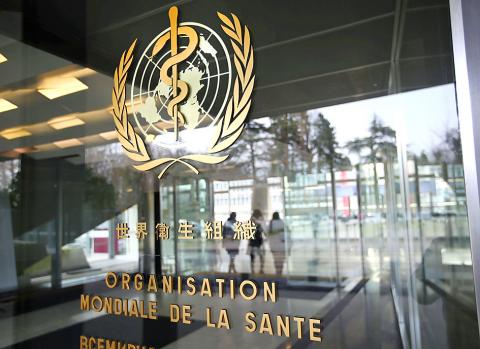The Australian Office Taipei yesterday joined other nations calling for Taiwan’s practical participation in the WHO, after representatives of the US, EU and Japan, as well as Taiwan’s diplomatic allies, spoke up for the nation at WHO executive board meetings in Geneva, Switzerland, this week.
“As the [2019] novel coronavirus [2019-nCoV] continues to underscore so starkly, diseases do not respect borders. In this interconnected and fast-moving world, it is clearly in all our interests that the WHO does not exclude populations or potential partners,” the office wrote on Facebook yesterday.
“Inclusivity has never been more important as we work together to manage this immediate global health emergency and, longer-term, to realize the world’s health-related sustainable development goals,” it wrote.

Photo: Reuters
The Canadian Trade Office in Taipei on Facebook shared Canadian Prime Minister Justin Trudeau’s support late last month for Taiwan’s role as a WHO observer.
The posts came after US Ambassador to the UN in Geneva Andrew Bremberg on Thursday urged the WHO to “engage directly with Taiwan public health authorities,” which prompted Chinese delegate Qi Dahai (齊大海) to reiterate Beijing’s claim that Taiwan is part of China, calling on attendees to stop “hyping up” the “so-called Taiwan issue.”
Since the daily meetings began on Monday, the delegates of eight of Taiwan’s diplomatic allies — Eswatini, Paraguay, Guatemala, Haiti, Honduras, Nauru, the Marshall Islands, and St Kitts and Nevis — have advocated Taiwan’s inclusion at the WHO to close global disease prevention loopholes.
They have been joined by delegates from the US, Japan, Germany (representing the EU), the UK, Australia, New Zealand and Belgium, which is very stimulating, the Ministry of Foreign Affairs said in a statement on Thursday.
The number and strength of foreign delegates speaking up for Taiwan has grown significantly, showing that the nation’s bid to join the WHO has secured general support from the global community, the ministry said.
Most of the foreign delegates voiced their support for Taiwan during discussions about public health emergencies, demonstrating the global community’s concern about the rapid spread of 2019-nCoV in China, and distrust over claims that Beijing and the WHO have fully cooperated with Taiwan on information about the outbreak, it said.
Minister of Foreign Affairs Joseph Wu (吳釗燮) on Thursday on Twitter called on WHO Director-General Tedros Adhanom Ghebreyesus to reconsider his statement praising China’s disease-prevention efforts, after Wu’s previous post highlighting the WHO’s misreporting of Taiwan’s confirmed cases and its reference to the nation using incorrect titles in its situation reports.
“One week ago, @DrTedros, you said: ‘China is setting a new standard for outbreak response.’ ‘China deserves our gratitude & respect.’ ‘I will praise China again & again.’ Are you going to stand by your statements or retract them? Hello?” Wu wrote.

MAKING WAVES: China’s maritime militia could become a nontraditional threat in war, clogging up shipping lanes to prevent US or Japanese intervention, a report said About 1,900 Chinese ships flying flags of convenience and fishing vessels that participated in China’s military exercises around Taiwan last month and in January have been listed for monitoring, Coast Guard Administration (CGA) Deputy Director-General Hsieh Ching-chin (謝慶欽) said yesterday. Following amendments to the Commercial Port Act (商港法) and the Law of Ships (船舶法) last month, the CGA can designate possible berthing areas or deny ports of call for vessels suspected of loitering around areas where undersea cables can be accessed, Oceans Affairs Council Minister Kuan Bi-ling (管碧玲) said. The list of suspected ships, originally 300, had risen to about 1,900 as

Japan’s strategic alliance with the US would collapse if Tokyo were to turn away from a conflict in Taiwan, Japanese Prime Minister Sanae Takaichi said yesterday, but distanced herself from previous comments that suggested a possible military response in such an event. Takaichi expressed her latest views on a nationally broadcast TV program late on Monday, where an opposition party leader criticized her for igniting tensions with China with the earlier remarks. Ties between Japan and China have sunk to the worst level in years after Takaichi said in November that a hypothetical Chinese attack on Taiwan could bring about a Japanese

Right-wing political scientist Laura Fernandez on Sunday won Costa Rica’s presidential election by a landslide, after promising to crack down on rising violence linked to the cocaine trade. Fernandez’s nearest rival, economist Alvaro Ramos, conceded defeat as results showed the ruling party far exceeding the threshold of 40 percent needed to avoid a runoff. With 94 percent of polling stations counted, the political heir of outgoing Costa Rican President Rodrigo Chaves had captured 48.3 percent of the vote compared with Ramos’ 33.4 percent, the Supreme Electoral Tribunal said. As soon as the first results were announced, members of Fernandez’s Sovereign People’s Party

MORE RESPONSIBILITY: Draftees would be expected to fight alongside professional soldiers, likely requiring the transformation of some training brigades into combat units The armed forces are to start incorporating new conscripts into combined arms brigades this year to enhance combat readiness, the Executive Yuan’s latest policy report said. The new policy would affect Taiwanese men entering the military for their compulsory service, which was extended to one year under reforms by then-president Tsai Ing-wen (蔡英文) in 2022. The conscripts would be trained to operate machine guns, uncrewed aerial vehicles, anti-tank guided missile launchers and Stinger air defense systems, the report said, adding that the basic training would be lengthened to eight weeks. After basic training, conscripts would be sorted into infantry battalions that would take